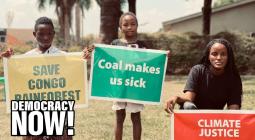At least 24 people dead as flash flooding hits eastern Uganda
At least 24 people have died and more than 5,600 people have been displaced by flash flooding in eastern Uganda.
Two rivers burst their banks after heavy rainfall swept through the city of Mbale over the weekend, submerging homes, shops and roads, and uprooting water pipes. About 400,000 people have been left without clean water, and more than 2,000 hectares (5,000 acres) of crops have been destroyed.
Rescue efforts have been hampered by rainfall, with a number of areas still inaccessible.
“The situation is very serious,” said Edward Simiyu, of Mercy Corps Uganda. “A lot of medical teams are needed on the ground. Dead bodies are being recovered, and more and more people are injured.”
Three health centres in Mbale were damaged and many people have had to travel up to 60 miles (100km) to find the closest hospital.
The government has deployed emergency supplies and is working with humanitarian aid agencies to provide temporary shelters, but teams on the ground said they were stretched.
“Many have lost everything and have had barely anything to eat over the last few days. There are small children who don’t have a change of clothes and many families are still looking for their loved ones,” said Joseph Ssenkumba, of the Association of Ambulance Professionals Uganda.
Simiyu said the flooding was unprecedented. “We believe that this is being fuelled by climate change because we’ve had heavy rains before but not to this scale,” he said.
Hundreds of people have lost their lives or livelihoods to floods in the hilly area of Mbale over the past five years. The impact of extreme weather events has been worsened by the clearing of land for farms and homes.
The Uganda National Meteorological Authority has predicted more rain in east Uganda over the next month. Authorities have advised people to evacuate the Mbale area and have been working to relocate those from areas around Mount Elgon. Only about 2,500 people out of a target of 100,000 have so far been relocated.
The head of communications at the office of the prime minister, Julius Mucunguzi, said: “The long-term solution is to protect the environment, stay clear of wetlands, riverbanks and avoid destroying river pathways. Climate change is evident. You can no longer predict when the rains will come and how intense they will be.”
About 300km north of Mbale, the Karamoja region has experienced severe drought over the last few months.
A World Bank report predicts that at least 86 million Africans will migrate within their own countries by 2050 as a result of climate change.


